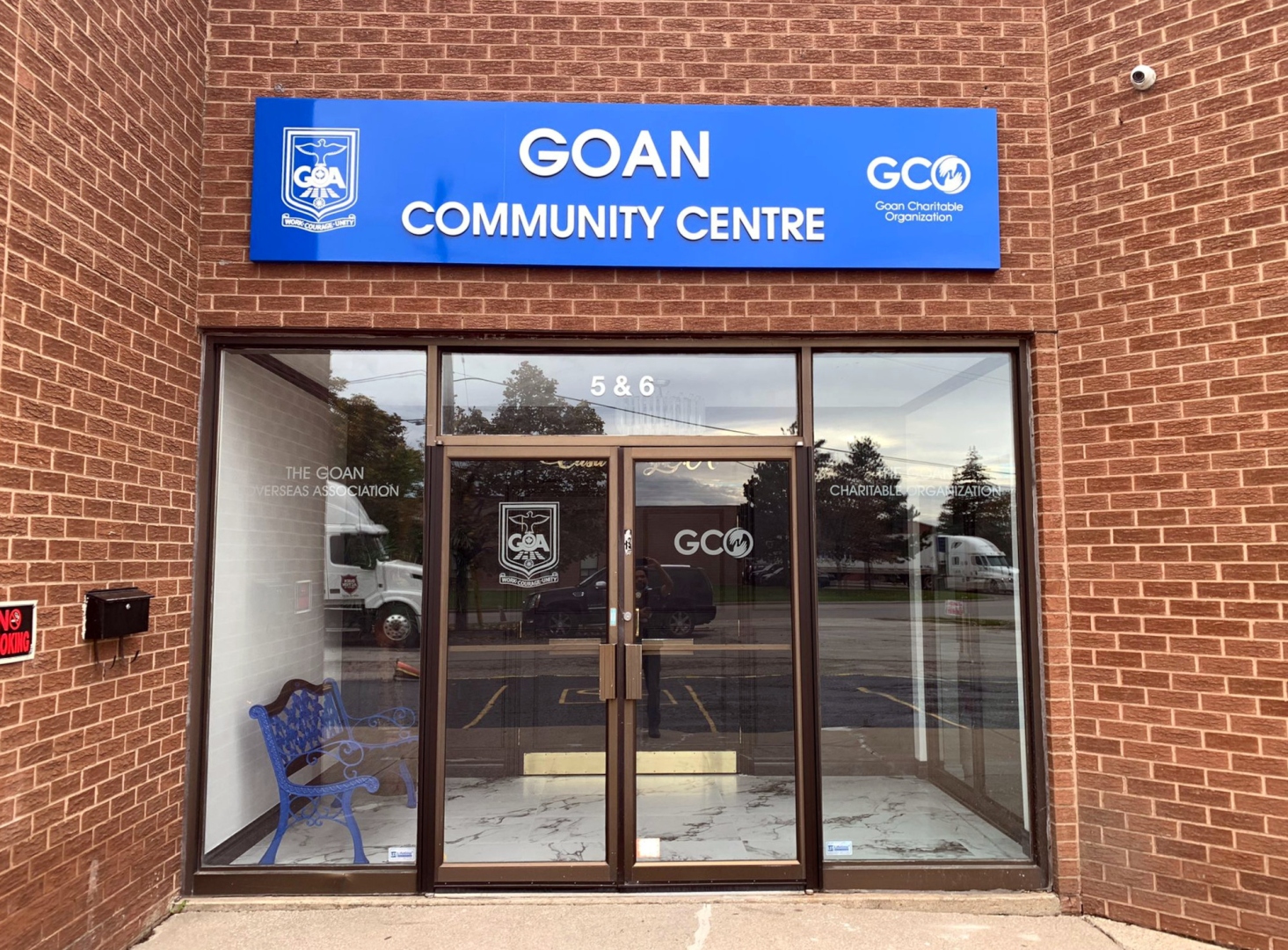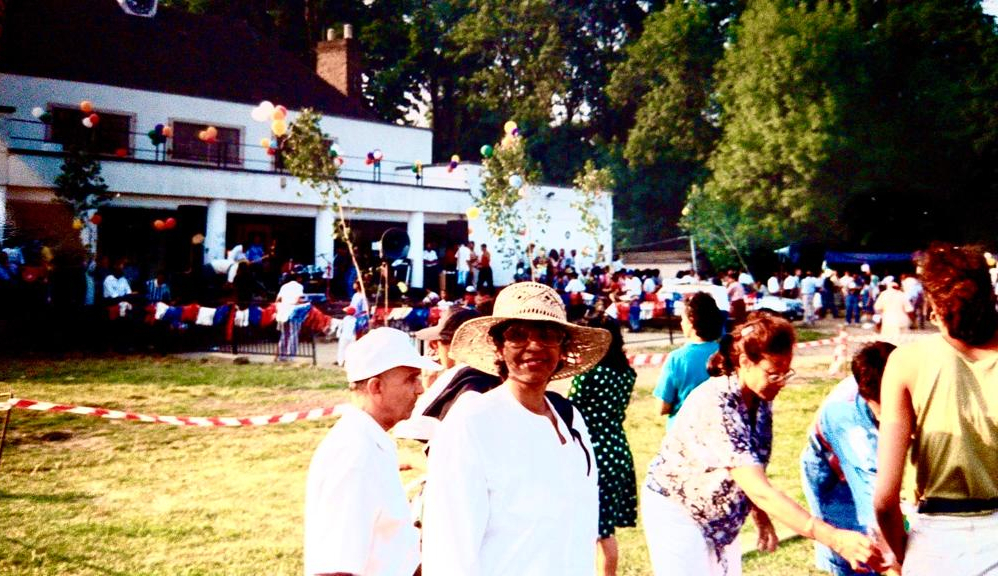Community centres have played an important role in providing space to Goans migrating to different countries, to enable them share their culture and connect with each other in a common place away from home. In recent times, some Goan associations have made efforts to set up new community centres, while some other associations and Goans believe the challenges of having a community centre outweigh the benefits. Melvyn Misquita interacted with Goans in Paris, Toronto, California, London and Melbourne for their views on the need, benefits and challenges in setting up community centres for the Goans

The Goan Community Centre is the first such centre for the Goan diaspora in Canada.
TORONTO
The Goan Overseas Association (G.O.A.) Toronto along with The Goan Charitable Organisation (GCO) set up a Goan Community Centre, the first such centre for the Goan diaspora at 20 Strathearn Avenue, Brampton, Ontario-Canada, on October 21, 2021.
“This was historic for the Goan community because this is the first time a Canadian and Goan Community Centre flag was raised at the building in celebration of its new home. The achievement is a result of the contribution of countless members of community volunteers who have worked very hard over the past 52 years to make this dream a reality,” said G.O.A. Toronto President Selwyn Collaco.
He said the centre provides various services and support to community members across all ages.
“The new community centre provides new immigrants, seniors, families and youth access to various programmes and services such as leadership and professional development programmes, senior’s programmes to help and encourage active living and mitigate social isolation, cultural and social programmes, community service initiatives to help the less fortunate,” said Selwyn.
“In the last 8 months, the centre has launched the seniors programme, whereby every Wednesday, the seniors are exposed to Zumba, line dancing, board games, etc. With the increase in participation, the programme is going to be now extended over two days on a weekly basis.”
“In addition, the centre launched Konkani classes, weekly ballroom lessons, youth leadership programme under toastmasters and online Math tutoring for grade 9 and 10 students. The centre has also been supported by various community members as a rental facility for private events.”
Selwyn said the centre also has future plans to introduce counselling services, career development initiatives for the youth and young adults including the launch of youth scholarships.
“We envision our community centre as a place that everyone can call “Home”. One unified roof to not only serve the social needs of the community but the key vision and strategy is to help provide support and guidance around wellness, education, counselling, language etc in a sustainable manner whereby, we can all work together to help strengthen the community by meeting the needs of the various demographics and at the same time create a sense of pride in our culture, heritage and identity in the younger generation,” says Selwyn.
CALIFORNIA
Joseph Lourenco empathised with Goan organisations keen to host events and keep the cost reasonable and said the situation has been different for Goans in California.
“At CalifornianGoans, we have never charged a cover charge/entry fee for any of our events, except for a Tiatr or Goan movie. We started the club small (5 persons) by self-funding events and then opened it up where people could pay/donate what they felt was reasonable. The reason being that we did not want to deter anyone from coming (especially the new ones) just because the cost is so high,” said Joseph.
“The way we raise funds now is via housie, stalls, games, annual raffle, etc which attracts people. At São João, one of our biggest outdoor events, we hold a Goan cooking competition. We are lucky to have a lot of good cooks, singers and connections with local restaurants that help drive the cost down plus we do a lot of pot-luck and most of our events (except for Christmas and Easter) are outdoor, so there is no hall charge. So, pulling resources together helped bring the cost down for us.”
Joseph said there had been a discussion about a Goan community centre in California, but added there were certain considerations peculiar to California.
“One issue is the cost of real-estate in Bay Area. We live in one of the most expensive parts of the country so purchasing real-estate would be hard. Then again, the upkeep of the property would be another issue.”
“Besides, we are blessed with great weather in California so only two of our events are held indoors while rest are outdoor events at parks or picnic areas.”
“Bay Area has a smaller population of Goans than most other major cities in US, UK or Canada. So, while we would love a community centre it is currently not a priority,” adds Joseph.
PARIS
Donna Anna Fernandes, who is based in Paris, said Goans at present have to contact the town hall of any arrondissement that provides them with facilities like stitching, computer courses, language classes, etc.
“The town hall encourages cultural activities like dancing and singing. However, halls cost a lot, around 1,200 Euros. Some are 500 Euros but get booked well in advance by various Tamil and French associations,” said Donna.
“Constructing a cultural hall is my objective for the benefit of Goans in Paris, keeping in mind that evangelisation is my primary objective, followed by encouraging musicians/theatres around the globe to perform here for the glory of God. Goan culture and traditions can also be showcased to the people of Paris.”
LONDON

Goans participating at the first ever Goan Exhibition and Festival on the grounds and Clubhouse (in the background) of the Goan Association in London on Sunday, July 14, 1985.
Photo: Raymond Carvalho
The Goan community in London had a Clubhouse and cricket ground of the Goan Association UK (GOA UK), which provided many opportunities for Goan families to enjoy several events for many years.
The Clubhouse was, however, destroyed in a fire sometime in September 1998 and the property was later sold off by the GOA UK.
In a previous article in The Global Goenkar, Raymond Carvalho, a senior Goan residing in London, recalled memories of the place. “The venue was ideal and in an isolated area, away from traffic noise. It is a shame that the Clubhouse got burnt,” said Carvalho.
There have been mixed views on the need for a new community centre in the UK.
Chris da Cruz, who is based in London, said any community centre needs to be centrally located to make it viable.
“This is very difficult in London as the community has its presence in West, North, South and East London. Sometimes, cutting through the traffic eats away hours. On a Sunday, it can take 2 hours to travel from South to the North of London,” says Chris.
He also felt that issues confronting Goans in Paris regarding hiring of halls and other expenses are similar for the Goan community in the UK.
“When we have feast celebrations, we have to consider the cost of celebrating a Mass, entertainment, catering, prizes, decor etc. At the end, we arrive at a basic cost per ticket by making some assumptions on attendees,” explains Chris.
“Allowing for discounted prices for children, etc, we cannot run a function lower than a break-even price of £18 per adult. There is a misconception that charging above these rates is "too much". In fact, if one were to go to a restaurant for the same meal, they would end up paying a minimum amount of £20 per person, and that too, without any live entertainment, etc.”
Chris felt organisers of Goan functions should not feel shy to charge what it takes to run a function and with some profit, should the event be there to support a cause.
“Our local priest once said at an appeal for funding, "the church cannot exist on Hail Marys only, funding is a key to its existence.” If we all want to retain our Goan culture and promote its wonderful aspects, an increase in ticket prices is a necessity. It all depends on how it is presented and accounted for.”
On the other hand, there are those who believe in the benefit of a community centre.
Micheal Bevan D’Silva, president of the new Goan association The United Goans Affiliation United Kingdom Limited (UGA UK) said one of the priorities of his association is to establish a ‘Community Centre’, with a view to promote Goan traditions.
“Once established, this Community Centre will cater to most Goan requirements, right from teaching Konkani, staging tiatrs and other social functions to promoting Goan culture and its values to the younger generation. It will also help seniors and others to meet and keep them connected,” says Michael.
“Our vision, aim and objective is to build a strong solid foundation for a community centre that will be a focal point for the current and future generations. At present, Goans do not have their own centre, unlike other ethnic communities.”
“With a large Goan community in and around Greater London, it is important to establish a place of our own making it an attraction for all Goans.”
Denzil D’Souza, who resides in Swindon, said the organisers at the Swindon Ponda feast charge £10 per person (children free).
“But the prices are completely different in London. The only way we Goans can cut down on cost is if Goans have their own community hall. Michael Bevan D’Silva (London) and Imtiaz (Swindon) are working really hard to set up a place for the Goan community,” said Denzil.
MELBOURNE
Frankey Fernandes said the idea of a community centre for the Goan community in Melbourne had come up in the past.
“While it is a great idea to have something of one’s own, we need to understand the geography of Melbourne or Victoria. We have a coastline of 512 kms and in between, are the many suburbs. Goans are scattered all over Victoria and Melbourne is only the city. So, the question arises, where are the Goans going to have their own community centre,” asks Frankey.
“For a few Goans like me who live in the Western suburbs, travelling to Dandenong takes over 1 hour during off-peak hours. We would need to travel far to visit any one such centre.”
Frankey said there are other challenges in setting up a community centre.
“There is plenty of land but identifying the right place convenient to all is important. The government does have schemes for such community centres but the Goan association also needs to make sufficient funds available. The question arises on maintenance costs.”
Frankey admits there are limited benefits of a community centre for the Goan community in Melbourne.
“In my opinion, there are not many benefits and only benefit is the Goan community would have something to call their own. But if we do have a centre, it would have to be thrown open to other communities on rental basis to recover maintenance cost.”
“Besides, Goans presently conduct events in Melbourne and there are many community centres catering to 50-150 people in almost all suburbs. Local councils also have larger halls which can accommodate 400-600 people, where the association usually have their dances,” says Frankey.
“One of the arguments of those who favour a clubhouse in Melbourne may be because of the highest number of Goans living in Victoria. Honestly, I haven’t come across any data to back this claim that the number of Goans in Victoria is more as compared to Sydney (NSW) or Perth (Western Australia). But then, if they are more in Victoria, they are not just in one area but scattered all over Victoria, so the question is where in Victoria would you want the clubhouse?"